Thoreau's Legacy (18 page)
Authors: Richard Hayes
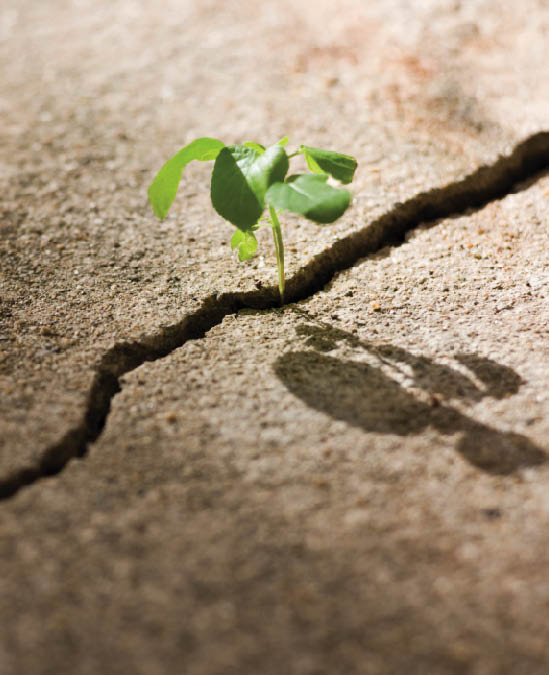
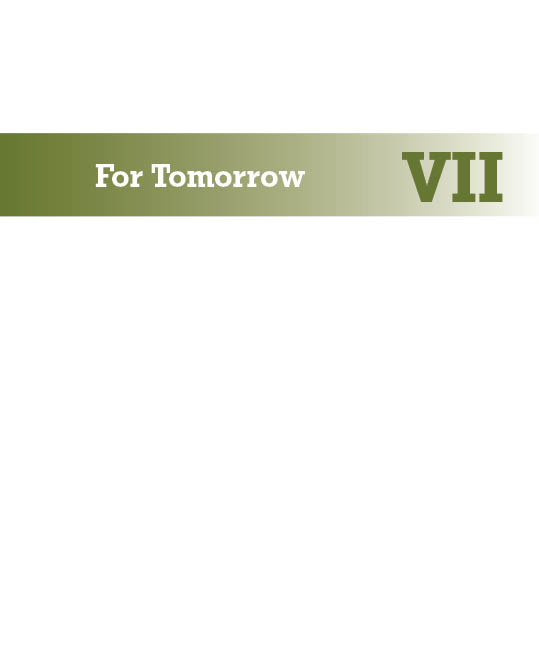
A Teachable Moment
Frank Schwing
Human history becomes more and more a race
between education and catastrophe.
—H. G. Wells
AS AN OCEANOGRAPHER AND CLIMATE SCIENTIST,
I have had the opportunity to witness and play a part in the research that has built an overwhelming case for human-caused climate change. The science community has the responsibility to inform the public about the rapid changes occurring in our climate, to foster a scientifically literate electorate, and to educate tomorrow’s citizens and leaders about the perils of not acting swiftly and comprehensively to reverse the forces driving global warming.
I have given dozens of public presentations and lectures, many of which our son and daughter attended. Even in grade school they could explain the mechanisms of global warming. At a beach party they were able to study the waves and warn us all that the rising tide would sweep away our fire (yes, it really happened!). My wife and I have taken advantage of numerous “teachable moments” to talk about climate change, such that it has become a running family joke; “Science Talk with Frank Schwing,” our kids would proclaim whenever I began telling some story about science in the everyday world.
As I approach the later stages of my scientific career, I could define my legacy in a number of ways. I’ve been fortunate to serve as a researcher and manager in a federal agency dedicated to understanding climate change and guiding our nation’s efforts to address its effects. With a cadre of talented colleagues, I’ve published scientific papers, helped plan our national climate-change research program, and reviewed international climate assessments. My family has two hybrid cars, and this year we installed a solar-power generating system for our house.
But
my greatest legacy
is a living one.
Eye-rolling and joking aside, our children, now young adults, recognize—as do many others I’ve encountered—that the consequences of climate change will be their unfortunate inheritance. They also understand that dealing with and solving this global problem will be theirs. My wife and I share a great pride, not only in what they have learned, but in the joy with which they pursue scientific truth and their appreciation of the urgency of creating a scientifically literate public.
Our children will carry on the fight to slow and ultimately reverse global climate change because no one else can do so; there is no other option. I look at their young, confident faces, and I, too, am confident that they will succeed.
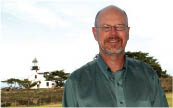
Frank Schwing
is an oceanographer with the U.S. National Oceanic and Atmospheric Administration and director of the Environmental Research Division of the NOAA Fisheries Service. A native of West Virginia, Frank resides in Monterey, California.
The Burns Homestead
Andrea Burns
Our home is a piece of art and
a work in progress.
Designed and built by my husband, Jeff, it includes straw-bale walls, solar electricity, passive solar heating and cooling, superefficient appliances, natural roofing (living plants and cedar), local nontoxic materials, radiant floor heating, water heated by a wood stove, plenty of daylight, insulated curtains, an indoor greenhouse, and a garden that feeds us for much of the year.
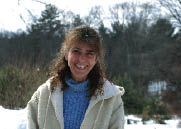
Andrea Burns
lives in Sanbornton, New Hampshire, where she and her husband grow much of their own food and homeschool their kids. She enjoys hiking, swimming, and playing music.
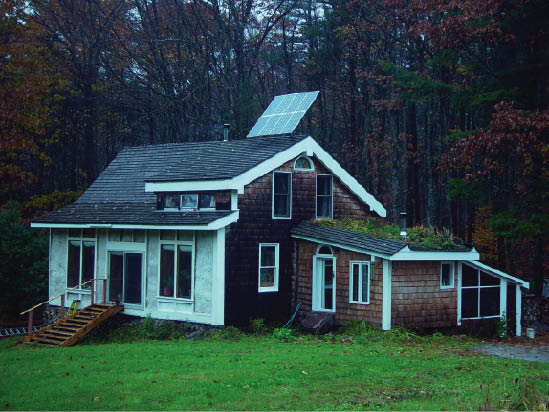
The Burns homestead in Sanbornton, New Hampshire. Photo by Andrea Burns.
One Professor in a Classroom
Melanie Szulczewski
WHEN YOU HEAR THE SOUND OF SNORING IN YOUR
classroom as you discuss the causes and implications of global warming, it is easy to become discouraged. And when a skeptical student asks, “Can one person really make a difference?” sometimes all I can do is sigh and wearily think, I’m trying to.
As I observe my students drive to campus in their SUVs and balk at taking the subway for a group trip to a science museum, clamoring instead for the gas-guzzling vans other professors use, I can’t help but consider the nature of my role as an environmental science professor.
Should I limit myself to
explaining the facts
behind the greenhouse effect
and the consequences to the earth’s ecosystems from climate change? Perhaps I shouldn’t try to persuade students to become stewards of their environment by showing graphs of carbon-dioxide emissions from various sources and then displaying images of fuel-efficient cars and compact fluorescent light bulbs and the cumulative effects of using them. I even try appealing to their wallets by having them calculate the savings to their electricity bills and fuel-pump expenses if they changed to a more sustainable lifestyle. One student raises his hand to ask, “Will that formula be on the test?” Sigh.
Then, at the end of the semester, a student shows up with a newspaper and a bulging plastic bag. She waves the paper enthusiastically and says, “There’s a sale on compact fluorescent light bulbs—I just bought two packs!” Another student asks for directions to the store and explains that she convinced her mother to buy a front-loading washing machine. As the students chatter about their ideas for reducing their carbon footprints and for passing on information to their families, I realize that they
have
been listening to me. But, more importantly, their new knowledge has motivated many of them to take action to reduce their carbon-dioxide emissions and even persuade others to do so too. I feel rejuvenated as I conclude that no matter what some experts say, one professor in a classroom really can make a difference.

Melanie Szulczewski
is an assistant professor of earth and environmental sciences at the University of Mary Washington in Fredericksburg, Virginia.
Passing It On
Gillian Zaharias Miller
Summer 1984, Iowa.
My sister and I are stepping carefully through tall, marshy reeds along the shore of Little Spirit Lake. Leopard frogs are tricky to catch, much faster than docile toads. Our mother points out the local creatures in a field guide. I am eight years old, blissfully innocent of the connection between my amphibian friends’ survival and the planetary warming caused by my own species’ dependence on fossil fuels.
Earth Day 1990, Iowa.
I am fourteen, proudly wearing a T-shirt admonishing “Cool It!” across a picture of the earth. I am an earnest member of the World Wildlife Fund, which graciously accepts my periodic gifts of five dollars.
July 2006, California
. I am admiring a snow bank dripping rhythmically into the glassiest of lakes. My vantage point is a tiny inflatable boat that my husband has packed in for our trek into the Sierra Nevada. We set up camp by Heather Lake, cradled by granite peaks and wind-contorted pines. It occurs to me that this very snow is a vital water source for people all over the state. It feeds lakes, streams, and reservoirs. Yet the Sierra snow pack is already diminishing because of climate change. In a few generations, I wonder, will these mountains be dry?
August 2007, Iowa
. I am five months pregnant and need to make a grocery run. After several years in the hectic San Francisco area, we have returned to our home state, close to family. I think back to the life we fashioned in California, where I biked to work, took the train to Sierra Club meetings, and walked to the farmers’ market. At present, it is 95 degrees and oppressively humid. The thought of a thirty-minute walk to the store is too miserable to contemplate, so I get into the car. My low-impact habits will need some adjusting.
September 2008, Iowa
. I am pushing our Sunlawn reel mower across the yard when a neighborhood kid comes over. “Cool!” he says. He has never seen a mower that uses only human power. “Can I try?” Soon the girl across the street wants a turn. Two more kids appear. “My turn!” I laugh at the sight of four young people vying for the chance to mow my lawn pollution-free.
October 2008,
Iowa. I am on a step stool picking lima beans, the baby watching from a blanket.
She shifts her focus to the grass, picks a blade, examines it like a
miniature scientist.
I’m poised to hop down should she decide to give it the taste test, but I’m happy to let her explore. I was raised to see the value of toads and trees alike; this is a gift I want to pass on. To this ethos I will add the responsibility we all share to protect human life—and indeed all living things—by minimizing our impact on air, water, and climate. Buy less stuff, eat plants, ride your bicycle, clean with vinegar, print on both sides, hang out the laundry. Every choice matters.
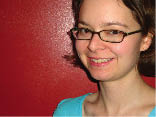
Gillian Zaharias Miller
is a former research engineer who now works as a part-time scientific editor and full-time mom. She lives in rural eastern Iowa with her husband, daughter, and adopted hound.